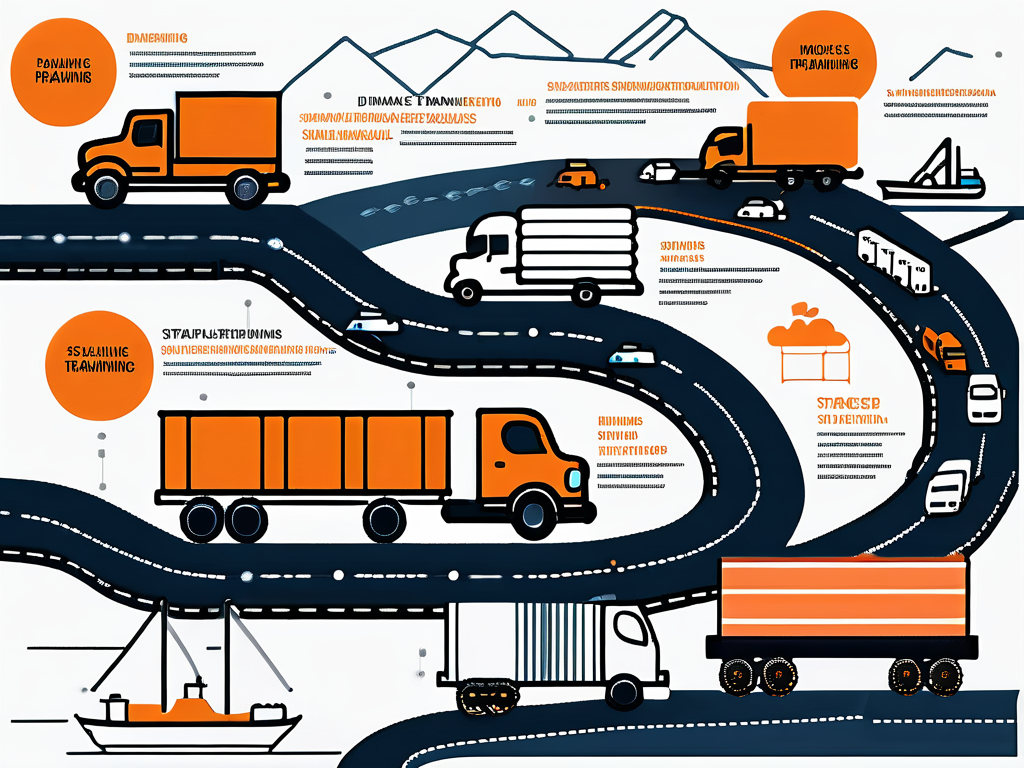Relocating to a new location, particularly over long distances, can be a daunting task. The logistics involved are multifaceted, requiring careful attention to various details. This article provides comprehensive insights into the essentials of long-distance relocation to help streamline the process and mitigate the associated stress.
The Basics of Long-Distance Relocation
Defining Long-Distance Relocation
Long-distance relocation generally refers to moving your residence or business from one location to another that is typically over 100 miles away. This type of move can be intrastate, occurring within the same state, or interstate, crossing state lines. Regardless of the specific logistics, these moves often involve different challenges compared to local relocations.
Understanding the definition is crucial as it sets the stage for the complexity involved. Long-distance moving is not just about transportation; it involves legal aspects, planning, and much more, which we will explore throughout this article.
Key Factors in Long-Distance Relocation
- Distance: The sheer length of the move can impact planning and execution.
- Timing: Seasonal factors and personal schedules can influence the timing of your move.
- Budget: Financial constraints will dictate many decisions regarding your relocation.
- Logistics: Everything from packing to transportation methods must be considered in advance.
Each of these factors plays a vital role in shaping your moving strategy. By assessing these elements upfront, you can create a more tailored and effective plan that meets your specific needs.
In addition to these key factors, it’s essential to consider the emotional aspects of a long-distance move. Relocating can be a significant life change, often accompanied by feelings of excitement and anxiety. Leaving behind familiar surroundings, friends, and routines can be daunting. It’s important to acknowledge these feelings and allow yourself time to adjust to the idea of moving. Engaging in open conversations with family members about their thoughts and concerns can also help ease the transition and foster a supportive environment.
Moreover, researching your new location can significantly enhance your moving experience. Understanding the local culture, amenities, and community resources can help you feel more at home in your new environment. Whether it’s exploring nearby parks, schools, or local businesses, being proactive in familiarizing yourself with the area can provide a sense of belonging and make the adjustment period smoother. This preparation not only aids in logistical planning but also enriches the emotional journey of your long-distance relocation.
Planning for a Long-Distance Move
Time Management in Relocation
Efficient time management is crucial when preparing for a long-distance move. Begin by creating a detailed timeline that outlines each phase of the moving process. From sorting belongings to scheduling transport, having a clear roadmap will help ensure nothing falls through the cracks.

Consider breaking your timeline into specific categories, such as ‘two months before the move’, ‘one month before’, and so on. This will help you manage your tasks over a broader time frame, enabling you to plan better without feeling overwhelmed. Additionally, it can be beneficial to set reminders for important deadlines, such as notifying utility companies of your move or updating your address with banks and subscriptions. Using digital tools or apps designed for project management can also streamline this process, allowing you to visualize your progress and adjust your plans as needed.
Budgeting for Your Move
Setting a budget is another essential aspect of moving. Begin by estimating costs associated with moving supplies, transportation, and potential storage needs. Consider the following when creating your budget:
- Cost of professional movers versus DIY options
- Expenses for packing materials
- Fuel costs for a rental truck
- Storage fees if necessary
Having a well-planned budget not only provides peace of mind but also helps you avoid unexpected expenses: a critical aspect of long-distance relocations. Moreover, it’s wise to include a contingency fund within your budget, as unforeseen costs can arise, such as needing to purchase additional packing supplies or last-minute travel expenses. Researching different moving companies and comparing their rates can also help you find the best deal, and don’t forget to ask about any discounts or promotions that may be available during your moving period. This proactive approach to budgeting can significantly ease the financial burden associated with relocating.
Expert Insights into Packing and Transportation
Efficient Packing Strategies
Packing efficiently can significantly reduce stress during a long-distance move. Start by decluttering your belongings before the move. This involves categorizing items into keep, donate, and discard. By minimizing the number of items to transport, you will save time and money.
Select suitable packing materials and pack room by room, labeling each box with its contents. This makes unpacking considerably easier and more straightforward when you arrive at your new home. Additionally, consider using padding materials like bubble wrap or old newspapers for fragile items, ensuring they are well-protected during transit. It’s also wise to pack a separate essentials box that contains items you’ll need immediately upon arrival, such as toiletries, a few changes of clothes, and important documents. This way, you won’t have to rummage through multiple boxes to find what you need right away.
Choosing the Right Transportation Method
Your transportation method will greatly depend on factors like budget, volume of belongings, and personal preference. You may opt for one of the following:
- Hiring a full-service moving company, which may be more convenient but comes at a higher price.
- Renting a moving truck if you prefer a DIY approach and want to save costs.
- Using a freight service for large volumes, which can sometimes be more economical.
Each option has its pros and cons; thus, carefully weigh your choices before deciding on the most suitable approach for your move. If you choose to hire a moving company, make sure to research and read reviews to find a reputable provider. Ask for quotes from multiple companies to ensure you’re getting a fair price. On the other hand, if you decide to rent a truck, familiarize yourself with the rental agreement and check for any hidden fees. It’s also crucial to plan your route in advance, especially if you’re navigating through unfamiliar areas or need to account for truck restrictions on certain roads.
Dealing with Legal and Regulatory Aspects
Understanding Interstate Regulations
If your move crosses state lines, you need to be aware of the various regulations that could apply. Laws governing long-distance moves can vary significantly from one state to another. Researching these regulations can save you from potential pitfalls later.
Consider your new state’s requirements for vehicle registration, property taxes, and any relevant moving permits. Understanding these aspects will aid in a smooth transition and reduce the likelihood of facing fines or other legal complications.
International Relocation: What You Need to Know
If you are planning a move to another country, the complexities escalate even further. International relocations typically involve customs regulations, international shipping rates, and documentation that you may need to prepare. Here are a few tips:
- Understand both countries’ customs regulations.
- Prepare necessary documentation, including visas or work permits.
- Consider hiring an international moving company for assistance.
Taking these steps will help ensure that your international relocation goes smoothly, avoiding unexpected hassles when entering your new home abroad.
Overcoming Common Challenges in Long-Distance Relocation
Mitigating the Stress of Moving
Moving can be a stressful experience, particularly if you are uprooting your life for a long-distance relocation. To mitigate this stress, ensure you are well-prepared. Create checklists, stay organized, and perhaps most importantly, allocate time for self-care amidst the chaos. Taking time to relax during the preparation process can help maintain your focus and reduce feelings of anxiety.
Addressing Common Relocation Concerns
Lastly, it’s crucial to address common concerns that arise during long-distance moves. Many people worry about the safety of their belongings, the reliability of the moving company, or settling into a new community. Communicate clearly with your moving company to ensure all logistics are understood and maintained.
Research your new area thoroughly, which enables you to integrate more easily once you arrive. Joining local community groups or forums can also help you make connections, alleviating the feeling of isolation that sometimes accompanies relocation.
In conclusion, understanding the logistics involved in long-distance relocation can be the key to a successful move. By managing your time, budget, and logistics effectively, you can ensure a smoother transition into your new home. With careful planning and expert insights, your long-distance move can be a positive experience.
















